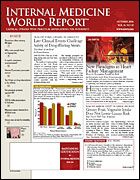Generalized Anxiety Linked to Functional Decline in the Elderly
From the American Psychiatric Association Common Condition with Aging, but Not Necessarily Benign
TORONTO—In older adults, generalized anxiety disorder (GAD) is more common than depression and is strongly associated with perceived functional decline, according to new findings presented at the 159th Annual Meeting of the American Psychiatric Association.
Elderly patients with GAD may be at increased risk for cognitive impairment and sleep disorders.
“Studies have shown that generalized anxiety disorder is more common in the elderly, affecting 7% of seniors, than depression, which affects about 3% of seniors,” said Eric Lenze, MD, of the University of Pittsburgh School of Medicine.
GAD is characterized by excessive, exaggerated worry over routine life events and activities that continues for a period longer than 6 months. Dr Lenze noted that elderly patients with GAD appear to be at increased risk of cognitive impairment and sleep disorders. The condition can also interfere with activities of daily living.
Anxiety is often considered an inevitable consequence of aging or an unavoidable complication of medical illness in elderly persons, said Amany Haroun, MD, of the Institute of Psychiatry, Ain Shams University, Cairo, Egypt.
Anxiety and other common psychological disorders have not been well characterized in the elderly, Dr Haroun explained, and the relationships between psychological and medical illnesses in this patient population are poorly understood.
Dr Haroun and colleagues recently characterized the psychiatric problems of 100 inpatients and outpatients recruited from a hospital geriatric department. All participants completed the Instrumental Activities of Daily Living scale, Mini-Mental State Examination, Geriatric Depression Scale, and other standardized tests.
Overall, 72% of the patients were diagnosed with anxiety state (situational form of worry and apprehension), 64% had depression, 35% had anxiety trait (broad, generalized proneness to anxiety), and 26% had mild cognitive impairment.
Anxiety state was significantly associated with perceived decline in functioning (P <.01). Neither anxiety trait nor depression was significantly associated with any clinical or sociodemographic variables.
The treatment of anxiety in older adults is similar to that in younger adults, although medication selection is more complex, because of the increased risk for adverse events and the potential for drug interactions resulting from the number of drugs used for concurrent disorders in this age-group, said George S. Alexopoulos, MD, professor of psychiatry, Weill Medical College, Cornell University, Ithaca, NY.
Benzodiazepines may be useful in the early phases of acute treatment of anxiety disorders in elderly patients until more definitive treatment with selective serotonin reuptake inhibitors takes effect, although benzodiazepines may increase the risk of falls and memory impairment and are frequently associated with dependence, Dr Alexopoulos said.
Arifulla Khan, MD, of the Northwest Clinical Research Center, Bellevue, Wash, and colleagues presented results of a study that investigated the safety and efficacy in elderly patients with GAD of pregabalin (Lyrica)—a gamma-aminobutyric acid analog indicated for the treatment of diabetic peripheral neuropathy and postherpetic neuralgia.
A total of 273 persons aged ≥65 years with GAD (mean duration, 17 years) were randomized to receive 150 to 600 mg/day pregabalin or placebo for 8 weeks.
At week 8, the mean change from baseline in total Hamilton Anxiety Scale score was —12.84 in the pregabalin group and —10.7 in the placebo group (P = .0437). Treatment with pregabalin was generally well-tolerated, with the most commonly reported adverse events being dizziness (20.3%), somnolence (13.0%), and headache (10.2%).
Key points
About 7% of elderly Americans have generalized anxiety disorder.
It is characterized by excessive, exaggerated worry over routine life events and activities for >6 months.
Treatment in the elderly is similar to that in younger adults, but medication selection is more complex due to increased risk of drug interactions.
Benzodiazepines may be useful in the early phases but they may increase the risk of falls and memory impairment and have been associated with dependence.
